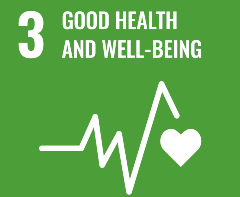
From clinical care to transport by air
COVID-19 has had a huge impact on our lives, direct and indirect. For one physician working at The University at Manchester, this has meant involvement in matters from clinical care to getting planes back in the air.
Ashley Woodcock is a Professor of Respiratory Medicine at The University of Manchester and a Consultant Physician at The North West Lung Centre at Wythenshawe Hospital, home to the biggest lung centre in Europe.
As the coronavirus took hold of the UK and beyond, he’s been involved in a remarkable range of activity to help tackle its impact.
He’s been coordinating the University’s response to support hospital trusts during the coronavirus epidemic, enabling academics to move across and work alongside clinicians in frontline roles such as nurses, doctors and pharmacists.
Alongside this, he’s been helping to find and test new treatments – and even to help make air transport as safe as it can be as flights return to our skies.
A lifeline for patients with respiratory health conditions
At the height of the pandemic, patients with severe lung function problems were advised to shield and to avoid contact with other people where possible. Professor Woodcock worked at Wythenshawe Hospital to support colleagues and hold telephone consultations.
These enabled clinicians to maintain contact with patients who were shielding and had concerns about their healthcare and pre-existing respiratory conditions.
“Those patients didn’t have coronavirus but, as they were unable to visit hospital, we offered telephone consultations to reassure them about what to do if they contracted the virus,” explains Professor Woodcock.
“Accurate advice is needed for each individual. For example, patients with mild to moderate asthma are no more at risk of being infected with COVID-19 than anybody else. Indeed, their inhaled treatments might prevent the development of severe COVID-19 disease.
“We gave them strong advice to take their inhalers regularly, and this improved their asthma too.
“I also supported the initiation of an innovative multidisciplinary ‘virtual clinic’ so that patients recovering with COVID-19 pneumonia could be discharged early and managed at home, with daily telephone contacts. This freed up hundreds of beds, which enabled Manchester Foundation Trust to manage the volume of patients.”
Deploying academic staff to Manchester’s hospital trusts
The Manchester University NHS Foundation Trust is reported to have had some of the best coronavirus outcomes in the UK.
“Our heroic frontline staff treating patients with COVID-19 have done so with outstanding calm competence,” says Professor Woodcock.
“Staff working on the frontline in intensive care, and in medical/respiratory wards, had a personal high risk of infection. It is to the eternal credit of many clinical academics that had no hesitation in working in these areas at no small risk to themselves.”
Developing COVID-19 drugs for clinical trials
As the global scale of COVID-19 became apparent, Professor Woodcock has been collaborating with Theravance Biopharma, a US -based pharmaceutical company, to conduct clinical trials of a drug being developed to address acute lung injury in hospitalised COVID-19 patients.
The Phase 1 study was rapidly delivered in the Medicines Evaluation Unit on the Wythenshawe site, with a ‘telescoped’ protocol straight into Phase 2 with Professor Jacky Smith and Dr Robert Lord, with the NIHR Manchester Clinical Research Facility (CRF) at Wythenshawe Hospital acting as the lead clinical site.
In June, the first patients with COVID-19 pneumonia were consented to take part in the trial.
Passenger safety during air travel
With increasing numbers of UK travellers now booking flights again to some of their favourite holiday destinations, it is timely that Professor Woodcock has led an expert aviation group, advising the UK Airports and Airlines and the Department for Transport about how to keep air passengers safe.
“The group developed a set of evidence-based recommendations that advise the air travel industry of the control measures they can put in place to operate safely,” explains Professor Woodcock.
Recommendations include using alcohol hand sanitisers frequently, wearing face coverings at all times, and staying physically separate from other people, where possible.
“The air on aeroplanes is replaced every three to five minutes and goes through highly effective HEPA (high-efficiency particulate-air) filters. Fresh air is also circulated and as a result, the air is as clean as an operating theatre, which I believe makes them the safest mode of public transport.
“With the measures we have put in place, the risk is minimal, and I would be happy to get in a plane tomorrow.”

